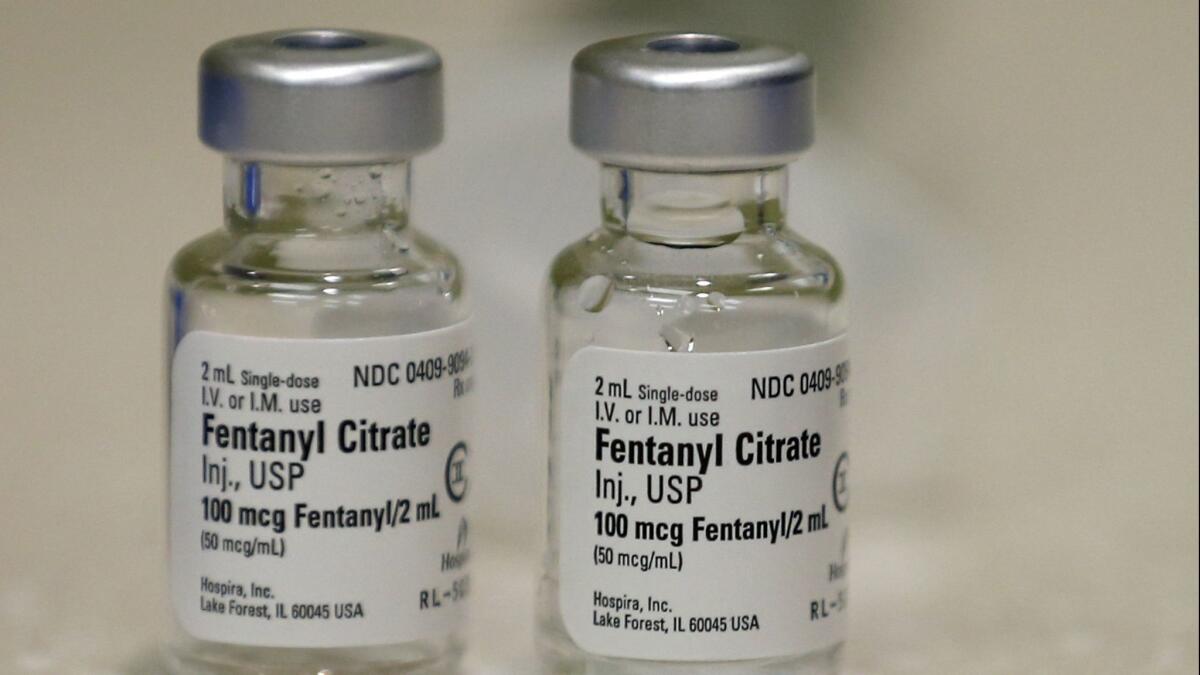Op-Ed: Big Pharma is quietly using nonprofits to push opioids

Last month, Democratic Sen. Claire McCaskill of Missouri introduced a bill going after, of all things, nonprofits. The word “nonprofit” tends to conjure images of idealistic charities committed to saving vanishing forests, teaching underprivileged kids or counseling the victims of sexual assault. The reality can be far different.
McCaskill’s proposed legislation follows from a scorching report she released in February detailing how opioid manufacturers funneled almost $9 million over five years to various advocacy groups that amplified messages and policies favorable to their industry. Many of these nonprofits had lobbied against laws to decrease opioid use and tried to downplay charges against physicians and pharmaceutical industry officials responsible for over-prescribing. As years of evidence began to confirm we were facing an epidemic, the Centers for Disease Control and Prevention issued the first national standards to limit opioid prescriptions for chronic pain in 2016. Many of these corporate-funded groups immediately began to criticize the new rules.
McCaskill’s bill, the Patient Advocacy Transparency Act, would require pharmaceutical manufacturers to disclose their payments to patient advocacy groups, professional societies and other nonprofit organizations. The bill builds on a 2010 law I helped draft as a Senate staffer on the Finance Committee. The Physicians Payments Sunshine Act requires these companies to report similar payments to doctors. The latest available data show that companies paid $2.8 billion in 2017 to U.S. doctors for gifts, meals, attendance at conferences and speaking fees. Researchers have found such gifts can bias patient care, and this law has now been replicated in several countries.
The tactic of employing nonprofits to push corporate messaging was first adopted by the tobacco industry in the 1950s.
As I and other Senate staff members worked to pass the Physician Payments act, we discovered that many patient advocacy groups and medical societies were not on our side, partly because so many of them took money from companies. I unearthed a marketing plan for the antidepressant Lexapro: Forest Laboratories had allocated $1.9 million to create beneficial relationships with professional associations, $240,000 for receptions at physician conventions and more than $750,000 for gifts for doctors at booths at professional meetings. This was money budgeted by one company, to market one drug, for one year.
In a meeting with the then-president of the American College of Cardiology, I asked about reports that a new cholesterol drug might be no more effective than a generic. Why not advise physicians that their patients might be better off paying for the cheaper choice? He told me his group didn’t advise physicians on drug pricing. When Senate staffers later looked up the society’s board members, we found that many had consulting arrangements with the pharmaceutical industry.
Senate investigations have uncovered conflicts in countless nonprofits: When I was on staff, we discovered that drugmakers were the principal donors to one of the largest mental illness patient groups, and that an organization that writes guidelines on medical device use collected half of its $16-million annual budget from the makers of devices and drugs. The day after the American Pain Foundation got a letter from senators demanding that it disclose its donors, the foundation shut down. The organization, which described itself as the nation’s largest organization for pain patients, was later found to have received 90% of its funding from the industry.
Enter the Fray: First takes on the news of the minute from L.A. Times Opinion »
As documented by Harvard historian Allan M. Brandt, the tactic of employing nonprofits to push corporate messaging was first adopted by the tobacco industry in the 1950s. The public relations firm Hill & Knowlton created and ran the Tobacco Industry Research Committee, an ostensibly unbiased source of scientific expertise on the health effects of smoking. In fact, the research committee purposefully created confusion about the known dangers of tobacco.
Since that time, academics and investigative reporters have uncovered documents showing that other industries have glommed onto this strategy. Soda companies have funded dozens of groups to shift the discussion on obesity away from diet, and agrochemical companies have thrown money at nonprofits to undermine science and policy on the dangers of pesticides.
But the deployment of this strategy with painkillers cannot be ignored. According to the latest government figures, opioid overdoses killed more than 42,000 Americans in 2016. At a recent medical conference, Deputy Atty. Gen. Rod Rosenstein described the epidemic in stark terms, blaming the spread of opioids for decreasing the lifespan of Americans and costing our healthcare system more than $1 trillion this century.
We have likely not reached the apex of this crisis, and McCaskill’s bill is an obvious defense. We need to name those influencing healthcare policy and the doctors who prescribe painkillers, and reveal the hidden corporate money behind misinformation that has fueled this tragedy.
Paul D. Thacker is a former staffer with the U.S. Senate Finance Committee.
Follow the Opinion section on Twitter @latimesopinionand Facebook
More to Read
A cure for the common opinion
Get thought-provoking perspectives with our weekly newsletter.
You may occasionally receive promotional content from the Los Angeles Times.










